atheism

The Friendly Atheist is one of the most influential atheist blogs on the Internet. The website’s 10 bloggers have contributed to CNN, Fox and Friends, NPR, the Washington Post, and the USA Today.
You may be surprised to read this, but I owe the Friendly Atheist a personal debt. My atheist brother invited me to officiate at his wedding ceremony with this condition, “As long as you don’t say anything about God.” I’m very close with my brother, so of course I agreed. I wrote the majority of the wedding ceremony with no problem. I easily secularized everything else, but was stymied by how to secularize the final blessing.
Since Google has all the answers, I typed the words “secular wedding ceremony blessing” into my search engine. The first link that appeared was the Friendly Atheist’s article “ A Secular Wedding Ceremony from Start to Finish.” The entire transcript for the secular wedding is beautiful. As I spoke the words of the Friendly Atheist’s final blessing, I experienced a profound sense of awe:
May the glory which rests upon all who love you, bless you and keep you, fill you with happiness and a gracious spirit. Despite all changes of fortune and time, may that which is noble and lovely and true remain abundantly in your hearts, giving you strength for all that lies ahead.
My brother and his wife expressed their appreciation for those words. My dad, a devout Christian, said it was the perfect capstone to the wedding. And all I could think were words of gratitude. “Thank God for the Friendly Atheist,” I said to myself.

A new survey shows in stark relief that what some are calling the Great Decline of religion in America continues: Since 2012, the U.S. has about 7.5 million more Americans who are no longer active in religion.
Last week, the 2014 General Social Survey was released. The GSS is the gold standard for sociological surveys. Funded by the National Science Foundation, this multimillion-dollar study gives us the most accurate data on American society — including religion.
(An important point to remember as you see the data: Each percentage point increase represents a growth of 2.5 million adults. So a 3-point rise in secularity, for example, means that about 7.5 million people left religion since 2012.)

It’s a common ritual in religious observances this time of year: Light a candle against the darkness, the winter, the uncertainty of the world.
But a newly minted observance called Secular Solstice adds its own spin. Those lighting the candles are nonbelievers — humanists, atheists, skeptics, and other freethinkers — and the candles represent no unseen divinity, but the actions and intentions of those who light them to make the world a better place.
“We live in a world beyond the reach of God,” one of the service’s many readers said as 130 or so people gathered huddled over white candles in glass votives at Humanist Hall — a purple-painted house near downtown Oakland. “It is a hard universe. If we want to build a softer universe we will have to do it ourselves.” As a choir broke into “Here Comes the Sun,” an inscription painted on the wall beamed down upon the gathered, “The world is my country, to do good is my religion.”
Secular Solstice is the handiwork of Raymond Arnold, a 28-year-old Catholic-turned-humanist who wanted to do something meaningful with friends in mid-December. He put together the first Secular Solstice — a two-hour blend of music and readings by candlelight — last year in New York, where he works as a web developer.
He struck a nerve — the first Secular Solstice was packed, and this year there will be Secular Solstices in New York, Seattle, San Diego, and Leipzig, Germany.
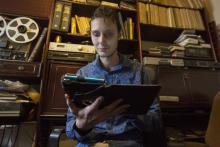
Two years ago, “Max” was a devout Catholic who loved his faith so much he would sometimes cry as he swallowed the Communion wafer.
Then came the Sandy Hook Elementary School massacre, where 20 schoolchildren and six adults were murdered by a troubled gunman. At that moment, a bell went off in his head, he said, ringing “there is no God, there is no God.”
Now, Max goes by his online handle “Atheist Max.” A 50-something professional artist from the Northeast, some days he now spends two or more hours online trying to argue people out of their religious beliefs in the comments section of Religion News Service.
Max left more than 3,600 comments in the past 12 months, making him RNS’ top commenter. Many of his remarks can be interpreted as angry, hostile, and provocative, casting him in some minds as an Internet “troll” — a purposely disruptive online activist who delights in creating comment chaos.
He’s written “Jesus is despicable” or its equivalent more than once — red meat to some readers who come back at him with fervor. Other users have called him “mean-spirited” or “angry.”
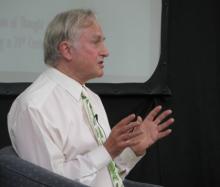
As the world’s most famous atheist, Richard Dawkins is no stranger to criticism from religious believers.
But in recent months, a few of his opinions have riled many in the atheist community as well. Remarks he made on Twitter and elsewhere on subjects ranging from sexual harassment (“stop whining”) to Down syndrome fetuses (“abort and try again”) have sparked suggestions from some fellow nonbelievers that he would serve atheism better by keeping quiet.
When asked about his controversial July tweets on pedophilia — Dawkins opined that some attacks on children are “worse” than others — the 73-year-old British evolutionary biologist and best-selling New York Times author declined to be interviewed.
But on a speaking tour through the San Francisco Bay Area in support of his new memoir, “An Appetite for Wonder,” he invited a reporter to sit down with him and explore the thinking behind his remarks.
Bottom line: He stands by everything he has said — including comments that one form of rape or pedophilia is “worse” than another, and that a drunken woman who is raped might be responsible for her fate.
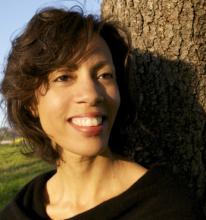
Absolutely, say organizers of a first-of-its-kind conference to be held by atheists of color in Los Angeles this weekend. And, they add, it’s about time those issues got some attention.
Called “Moving Social Justice,” the conference will tackle topics beyond the usual atheist conference fare of confronting religious believers and promoting science education. Instead, organizers hope to examine issues of special interest to nonwhite atheists, especially the ills rooted in economic and social inequality.
“Atheism is not a monolithic, monochromatic movement,” said Sikivu Hutchinson, an atheist activist, author and founder of Los Angeles’ Black Skeptics, one member of a coalition of black atheist and humanist groups staging the conference.
“By addressing issues that are culturally and politically relevant to communities of color, we are addressing a range of things that are not typically addressed within the mainstream atheist movement.”
The conference is unusual for an atheist gathering in another important way — its lineup of speakers includes members of the religious community. Hutchinson, often an outspoken critic of religion, described the conference as “effectively an interfaith conference.”

What does a map of the U.S. religious landscape look like in 140 characters?
A new study of Twitter finds that self-identified religious users are more likely to tweet to members of their own faith than to members of a different one. The study examined people whose Twitter profiles identified them as Christian, Jewish, Muslim, Buddhist, Hindu and atheist.
And while adherents of all six groups studied tweet frequently, atheists — among the smallest populations in the U.S. — are the most prolific.
“On average, we can say the atheists have more friends, more followers, and they tweet more,” said Lu Chen, a doctoral candidate at the Kno.e.sis Center at Wright State University who co-authored the study with Adam Okulicz-Kozaryn of Rutgers University-Camden. They will present their findings in November at the sixth annual International Conference on Social Informatics.
A new coalition of atheists, humanists and other nonreligious groups is taking a page from the gay rights movement and encouraging people to admit they are “openly secular.”
The coalition — unprecedented in its scope — is broadening a trend of reaching out to religious people and religious groups by making the secular label a catchall for people who are not religious.
“We wanted to rise above who is an atheist, who is an agnostic, who is a humanist, who is a secular Jew,” said Todd Stiefel, founder of the Stiefel Freethought Foundation and a main force behind the coalition. “This needed to be about something everyone could rally behind so we intentionally used the word secular because it was one thing we could all agree on.”
The campaign, “Openly Secular: Opening Minds, Changing Hearts,” was unveiled at the 65th annual gathering of the Religion Newswriters Association here on Sept. 20. It includes a website, resources for families, employers and clergy, and a YouTube channel featuring both prominent and rank-and-file nonbelievers announcing their names followed by the declaration, “I am openly secular.”
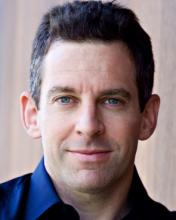
Uber-atheist Sam Harris is getting all spiritual.
In his new book, “Waking Up: A Guide to Spirituality Without Religion,” the usually outspoken critic of religion describes how spirituality can and must be divorced from religion if the human mind is to reach its full potential.
“Our world is dangerously riven by religious doctrines that all educated people should condemn,” he writes in the book, but adds: “There is more to understanding the human condition than science and secular culture generally admit.”
The prescription, Harris holds, is Buddhist-based mindfulness meditation. A Stanford-trained neuroscientist, Harris is a long-time practitioner of Buddhist meditation. He said everyone can, through meditation, achieve a “shift in perspective” by moving beyond a sense of self to reach an enlightening sense of connectedness — a spirituality.

Sit down and shut up.
That’s the message of a campaign launched Sept. 8 by the American Humanist Association, asking Americans to refrain from standing and reciting the Pledge of Allegiance until Congress removes the phrase “under God.”
The 29,000-member humanist activist group, which also advocates on First Amendment issues, holds that the phrase “under God” is an unconstitutional establishment of religion.
“Until the Pledge is restored to its inclusive version, we can take it upon ourselves to refuse to participate in what’s become a discriminatory exercise,” the campaign’s website, Don’t Say the Pledge, says. It also describes the current pledge as “twisted, with divisive religious language that implies true patriots must be believers.”

The American Humanist Association said Sept. 4 that an airman at Nevada’s Creech Air Force Base who crossed out “so help me God” in the oath the Air Force requires servicemen and women to sign was told in August he must sign it as is or leave the Air Force.
The AHA’s Appignani Humanist Legal Center sent a letter to the Air Force on the airman’s behalf demanding he be allowed to sign a secular version of the oath. The U.S. Constitution allows freedom of religious beliefs and prohibits religious tests for holding public office or public trust, the letter states.
The airman’s name is being withheld by AHA.
“The Supreme Court has held on a number of occasions that it is unconstitutional to force anyone to take an oath that affirms the existence of a supreme being,” said Monica Miller, an attorney for AHA and author of the letter. “Numerous federal courts have specifically held that forcing an atheist to swear to God violates the Free Exercise Clause as well as the Establishment Clause.”
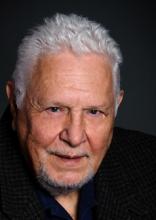
The atheist community is mourning the death of Victor Stenger, a prominent physicist who championed rooting out religion from the public sphere and was best-known for quipping: “Science flies you to the moon. Religion flies you into buildings.”
Stenger, who also graced a very short list of authors who hit the New York Times best-seller list writing about atheism, died August 25 in Hawaii. He was 79.
Atheist, skeptic and science blogs, in the U.S. and in England, were filled with tributes and remembrances over the long holiday weekend.
“Vic was an unassuming physicist and teacher who took on the challenge (of) taking science out of the classroom and applied it to some of our most sacred cows, from psychics and New Age belief to Intelligent Design creationism,” skeptic D.J. Grothe said on The Friendly Atheist blog.
Ron Lindsay, CEO of the Center for Inquiry, a humanist organization with a long association with Stenger, said on the same blog, “With Vic Stenger’s death, the secular and skeptic communities have lost an articulate, knowledgeable, and relentless defender of the naturalistic, scientific worldview.”
Though best-known in recent years for his atheism, Stenger was also a well-known particle physicist who contributed to groundbreaking work on gamma rays, quarks and gluons. One of his last projects was working on an underground experiment that showed the neutrino, a subatomic particle, has mass. He held professorships in physics, astronomy and philosophy.
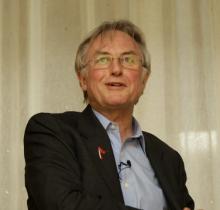
It was 2006’s “The God Delusion” that many credit with sparking a growing interest in atheism in the U.S. Along with best-selling books by the other members of the “Four Horsemen” of atheism—the late Christopher Hitchens, Sam Harris, and Daniel Dennett—Dawkins’ rising star mirrored the growth of atheism in the last decade.
In 2012, the Pew Research Center found 5.7 percent of Americans identified as either atheists or agnostics, up from 3.7 percent in 2007.
“Richard Dawkins has done a lot to bring atheism to a whole new generation,” said Phil Zuckerman, a sociology professor who studies atheism and who also credits Dawkins with speaking out against the pedophilia scandal within the Catholic Church. “On the other hand, Dawkins seems to embody everything that people dislike about atheists: He is smug, condescending and emits an unpleasant disdainfulness. He doesn’t ever seem to acknowledge the good aspects of religion, only the bad. In that sense, I think he doesn’t help atheism in the PR department.”
One of Dawkins’ biggest missteps came in 2011, when he blasted Rebecca Watson, a young atheist activist who wrote about feeling sexually harassed at a freethought conference. In a now infamous series of comments posted to the blog Pharyngula, Dawkins wrote in a message titled “Dear Muslima,” “Stop whining, will you? ... For goodness sake grow up, or at least grow a thicker skin.”

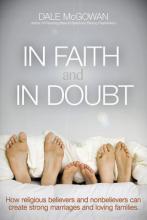
If interfaith marriages are supposedly doomed, Dale McGowan’s should have been toe-tagged from the start.
He’s a committed atheist; his wife comes from a line of Southern Baptist preachers. Yet 23 years and three kids later, they are still happily married.
“The key is to talk about your values,” McGowan said from his home in Atlanta. “A lot of time we mix up the words ‘values’ and ‘beliefs.’ Beliefs are what you think is true about the universe. Is there a God? Where do we go when we die? But values are what you believe are important and good. When you get couples talking about values they find out they share a tremendous amount, even if they don’t share beliefs.”
That’s what McGowan and his wife, Becca, did. While she believed in one God, she did not believe salvation could be had only through belief in Jesus. And he agreed that he could go to church with her — and did, for many years, with their children.
RECENT POLLS SUGGEST that America’s vaunted religiosity is slipping, including the percentage of people willing to identify themselves as evangelicals. At the same time, the percentage of avowed secularists has risen. A movement calling itself the “New Atheism”—those adamantly opposed to religion—has attracted a considerable following.
The oracles of this movement—including Richard Dawkins, Sam Harris, Daniel Dennett, and the late Christopher Hitchens—deny any possibility of the supernatural, assert that religious belief is irrational, and posit that religion has caused untold evil and suffering throughout history. Because of their dogmatism and their refusal to countenance views other than their own, I refer to these people as “secular fundamentalists.”
Hard data may be elusive, but the latest generation of American young people is much less religious than the last, and the growing secularism they represent could be a byproduct of the polarizing effect of the Religious Right. With evangelical fundamentalism being the dominant and most public form of U.S. Christianity over the last generation, young seekers would rather turn away from all religion than adapt to the harsh expression of faith that excludes so many of their peers and often stands against their aspirations for fairness and equality.
Religious fundamentalism has tainted the reputation of Christianity. For many, unbelief has become more palatable than belief, if believing requires an embrace of the distortions that have so characterized U.S. Christianity over the last several decades.
What prompted the emergence of this New Atheism or secular fundamentalism? What historical forces contributed to its rise? The roots of this phenomenon go back more than three decades—to the political mobilization of a different species of fundamentalism that became the movement commonly known as the Religious Right.
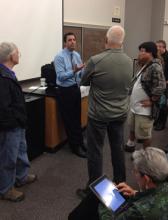
Move over, Christian televangelists. Atheism is coming to television.
“Why are we going to television?” he asked the audience, a mix of about 100 students and people from the local community. “It’s part of our strategy of going where we are not.”

Like lots of college students, Lauren has a smartphone loaded with some of the most popular apps around — Facebook, Twitter, and eBay. And like a lot of unbelievers, she asked to not use her full name because her family doesn’t know about her closet atheism.
One of the apps she uses most regularly is YouVersion, a free Bible app that puts a library’s worth of translations — more than 700 — in the palm of her hand. Close to 115 million people have downloaded YouVersion, making it among the most popular apps of all time.
But Lauren, a 22-year-old chemistry major from Colorado, is not interested in the app’s mission to deepen faith and biblical literacy. A newly minted atheist, she uses her YouVersion Bible app to try to persuade people away from the Christianity she grew up in.
“I know of a lot of atheists who have come to their nonbelief by actually reading the Bible rather than just the fluffy stories they choose to tell you about in church,” she said. “Reading the full story with all its contradictions and violence and sexism, it should make you think, ‘Is this really what I believe in?’ At least it did for me.”
Lauren is not alone. No one knows how many atheists have downloaded YouVersion and other smartphone and tablet Bible apps, but it is enough that word of the phenomenon has reached the Edmond, Okla., headquarters of LifeChurch.tv, the evangelical megachurch that created the app.
LAST YEAR on NPR’s “All Things Considered,” I heard the story of Teresa MacBain, a United Methodist pastor who came to the conclusion she was an atheist. The situation was scary and awkward for her. Who could she tell? What would she do now for a living?
She wasn’t trained for any other occupation, but neither could she continue her double life of preaching and public praying while knowing she didn’t believe in any of it.
Lacking someone to confide in, MacBain secretly confessed to her iPhone, “Sometimes I think to myself: If I could just go back a few years and not ask the questions and just be one of the sheep and blindly follow and not know the truth, it would be so much easier. I’d just keep my job. But I can’t do that. I know it’s a lie. I know it’s false.” Eventually, she left the ministry.
As I listened to MacBain’s interview, I empathized with her. After 30 years of serving as a Mennonite pastor, I often wonder whether I still believe the things I’ve always said I believed. My questions about God have become deeper, while my previous answers now sound shallow. The thought that I might not believe in God is frightening. It threatens my identity and worldview—not to mention my occupation. And yet I haven’t arrived at MacBain’s atheism. Instead, my doubts have been folded into my faith.

Richard Dawkins, one of the world’s best-known and outspoken atheists, has provoked outrage among child protection agencies and experts after suggesting that recent child abuse scandals have been overblown.
In an interview in The Times magazine on Saturday, Dawkins, 72, he said he was unable to condemn what he called “the mild pedophilia” he experienced at an English school when he was a child in the 1950s.
Referring to his early days at a boarding school in Salisbury, he recalled how one of the (unnamed) masters “pulled me on his knee and put his hand inside my shorts.”
He said other children in his school peer group had been molested by the same teacher but concluded: “I don’t think he did any of us lasting harm.”